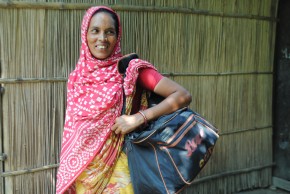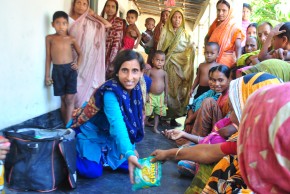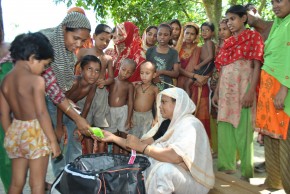Today I write this blog as Chief Executive of JITA - a globally groundbreaking Non-Governmental Organisation/private sector hybrid. However, my title wasn't always so business-like. I used to work for CARE International, in charge of Bangladesh's Rural Sales Programme (RSP).
The RSP was born out of necessity, when we at CARE found ourselves in a familiar charity conundrum: donor funds for our long-running cash-for-work scheme had dried up, but we were committed to working with Bangladesh's most marginalised women.

Women in rural Bangladesh form the majority of the chronically poor in that country. A woman's financial security - and even physical survival - are often linked to male family members, leaving widows, single mothers, and women whose husbands are ill or otherwise disabled at risk of destitution.
From my first weeks working at CARE, I developed a rapport with one such woman, Bani Zaman, a widowed mother of three living in the flood-prone region of Rangpur in Northern Bangladesh. Bani married when she was 12 or 13; she had little formal schooling and was unable to read or write.
Until her husband's death, Bani had never walked her village unaccompanied, or made a purchase at a local shop. She then found herself destitute almost overnight, resorting to begging and handouts for survival. CARE offered Bani a place in the cash-for-work scheme and for five years, she swept pavements and did basic road maintenance.
How could CARE provide alternative employment to women like Bani who depended on the programme? I was hired to apply business skills to develop financially sustainable programmes targeted at improving the lives of the poor. We knew that the quickest way to provide an income stream for women was not to seek additional donor funding, but rather to train the former cash-for-workforce to engage in sales. But they needed something to sell.

We began with just 49 saleswomen and, over the next months and years, we established relationships with companies such as BATA, Unilever, Grameen and Danone to diversify the array of goods the women could sell in their rural villages. The women become known as 'Aparajitas', or 'women who do not accept defeat' and, to the big companies involved, they were an affordable rural distribution network that allowed them to access the 'bottom of the pyramid' market.
Bani Zaman became an Aparajita, doubling her personal income in her first month. In time, the monthly incomes of Aparajitas grew to almost three times what they were when the programme was launched, and Bani Zaman was making enough to buy three meals a day for her family - with more cash than she had ever had access to in her life.
The sales network has now grown to 2,640 women in 80 districts, carrying goods from seven companies. True to our mission to break the cycle of donor funding, and serve the rural poor women of Bangladesh, the Rural Sales Programme has now become JITA - a social business, in partnership with danone.communities, with the goal of employing 12,000 women and reaching 10 million customers in Bangladesh by 2014.
JITA empowers rural sales women to sell products that they need from private sector partners, through a cost-effective, comprehensive rural distribution network.

The path to JITA has not always been easy, though, and there has been much organisational soul-searching.
From the very beginning, we envisioned a great future for RSP by expanding it throughout the country, but we faced some difficult questions: can selling consumer goods to the poor have a positive impact and achieve tangible results for rural marginalised women? Can NGOs stay true to their beliefs while opening up markets for multinational corporations at the bottom of the pyramid?
Using money from the UK Government's Department for International Development, CARE International UK invited University of Oxford's Saïd Business School to complete a four-year research project on the Rural Sales Programme. The School identified key factors through which the CARE- RSP team came to understand how women's empowerment can be realised in addition to creating and maintaining sustainable long-term relationships with private sector partners. Indeed, DFID supported the RSP and the formation of JITA at every step of the journey, from initial funding to get it up and running, to the transition of RSP into JITA via the Business Innovation Facility, which is funded by UK aid to help the development and uptake of inclusive business models by companies in developing countries.
This funding allowed for specialist consultants who helped us to forge a comprehensive business plan that stood up to the rigour of investor requirements and allowed us to meet our global business partners on an equal footing. The support was invaluable - as CARE, we simply lacked the 'business acumen' to do this ourselves.
Saïd Business School has now developed a teaching case on the CARE-RSP programme to be taught to MBA students at the School. They have also published an academic paper which discusses the extent to which such schemes offer a viable model for women's empowerment.
Last month, JITA was launched at the prestigious SKOLL World Forum on Social Entrepreneurship. In a time when many people feel that the world of business is in crisis, we're delighted that a top business school has decided to use JITA to encourage deeper thinking about the role of business in society in the minds of the business leaders of the future.
Please, this is a guest blog. Views expressed here do not necessarily represent the views of DFID or have the support of the British Government.
UK aid is changing lives - find out how and get involved on our Facebook page.


3 comments
Comment by Shaikh md. Motiur rahman posted on
Indeed, its a great work by saif. I personally appreciate it. I think if saif can proside further uninterruptedly and with the help of world forum relating to this issue it will then be an oportunity for the poor of developing countries as well as for the world future entreprneure in this aspect.
Comment by very good posted on
More steps should be taken to eradicate poverty through out , especially for
women of our country, though it is a great work indeed and should be apprecieted.
Comment by Hamles posted on
The School identified key factors through which the CARE- RSP team came to understand how women’s empowerment can be realised in addition to creating and maintaining sustainable long-term relationships with private sector partners. Using money from the UK Government’s Department for International Development. I would like to give you congratulation for this great content.